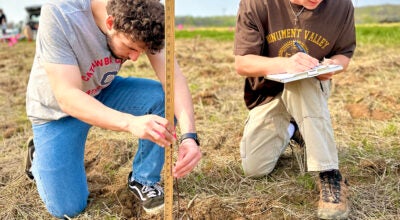A river’s keepers
Published 12:00 am Thursday, April 11, 2024
(Editor’s note: The recently published Spirit of Rowan featured a story by Salisbury Academy Upper School student Kylie Bailey about a field trip to meet Dr. Wayne Koontz, who shared tales of the Yadkin River’s rich past. The field trip was part of a larger course of study at the downtown-Salisbury school. Other students chronicled what they learned on various field trips and those stories are being shared throughout upcoming Salisbury Post editions. Today’s article is by August Hoffman and is the finale installment of the series.)
By August Hoffman
For the Salisbury Post
SALISBURY — Serving around 1.6 million residents, the Yadkin River is a crucial resource. Humans have settled around its waters for more than 10,000 years and hundreds of thousands of people rely on the river for their daily drinking water. The river is used for agriculture, industry, generating power, drinking water and recreation. All 1.6 million of us must take care of our river to preserve the immense resources it provides.
In the past few decades, the basin has experienced a decline in agriculture and forestland and a significant increase in urban development. Roughly 13.9 percent of the Yadkin River is considered developed, despite The Center for Watershed Protection finding that impervious surfaces unable to absorb water should not exceed 10 percent within a watershed as it negatively impacts ecosystems and aquatic life. By 2060, the developed land within the High Rock Lake watershed is expected to double from 13.3 percent to 32.2 percent.
Development may benefit the community economically, however, it can also take a significant toll on the health of the river. Population growth has been linked to water quality problems. The construction of homes and roads can cause sediment runoff which infiltrates the river. Sediment threatens aquatic life, the health of the river, and even the quality of drinking water. It is obvious why so many people want to settle on the Yadkin, however, appropriate measures must be taken to ensure its health.
The most crucial uses of the Yadkin River are the water and power it brings to the community. Approximately 841,000 people rely on the river for their daily drinking water. The intake for the water treatment plant in Rowan County is located at the merging point of the Yadkin and South Yadkin rivers. The plant typically pumps out 8-10 million gallons of water a day.
The Yadkin not only provides water for thousands but is also a source of renewable energy. High Rock Lake, which gets fed by the Yadkin River, is known to be the reservoir for hydroelectric power. The hydroelectric plant is managed by Cube Hydro Carolinas. The lake produces an average of 141,660 megawatt-hours of clean electricity per year. This is enough to power 13,621 homes across Davidson, Rowan and Davie counties.
The Yadkin River offers an abundance of recreational opportunities. Rowan County alone is home to numerous outdoor attractions, the most popular one easily being High Rock Lake. Founded in 1929, High Rock Lake covers a whopping 15,180 acres and has 365 miles of shoreline. The lake provides year-round water activities, outdoor adventures, parks, and hiking trails, as well as abundant wildlife. For avid hikers and nature lovers, Eagle Point Nature Preserve is available year-round. Eagle Point Nature Preserve not only offers hiking trails but even has canoe access and picnic areas surrounding the park. In addition, Yadkin River Park is located in Spencer, right at the border of Davidson County. The park has great walking trails, river accesses and amazing views.
The river brings a sense of community to Rowan County and other counties residing on the basin. It is not only the landmarks and attractions surrounding the river, but it is the river itself that brings a sense of belonging and comfort to many. This water source plays a significant part in providing for us as a community; as individuals, we cannot neglect it. There are numerous ways to preserve the Yadkin. We can start at home by reducing our water usage, recycling, avoiding fertilizers and eating locally grown foods. As a community, we can make an impact by working to keep our river clean and educating others. To learn more about how to keep our river clean, check out the Riverkeepers website www.yadkinriverkeeper.org.
We must work towards conserving the river, as we wouldn’t be here without it.


